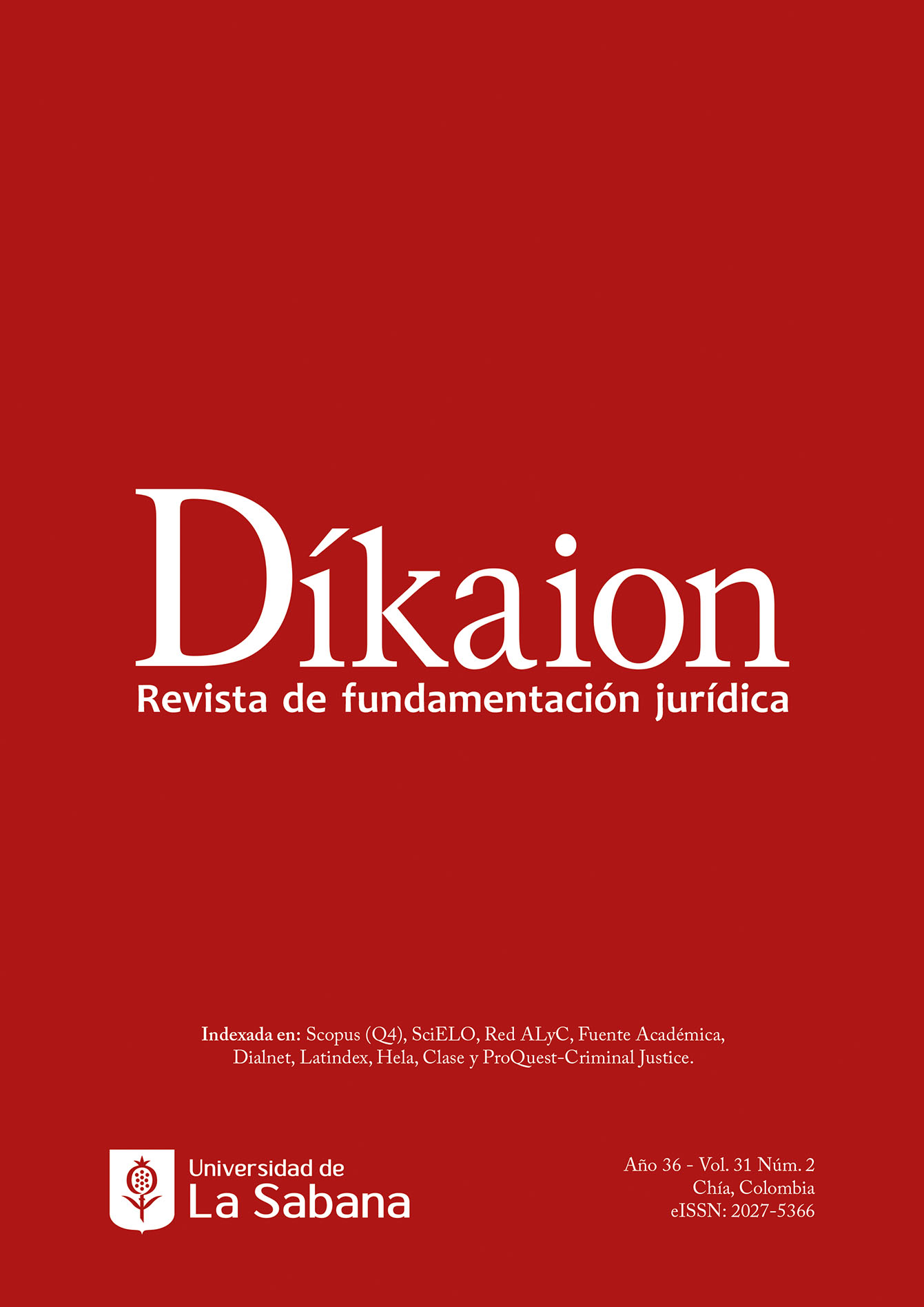Are Human Rights the Actual Subject Matter of Human Hope and the Measurement of Political Societies? An Appraisal of the Declaration of the Rights of Man and of the Citizen of 1789 in Light of Augustine Barruel’s Critique of its Philosophical Sources
DOI:
https://doi.org/10.5294/dika.2023.32.1.8Keywords:
Declaration of the Rights of Man and the Citizen, enlightened philosophy, political regimes, classical canons of discernment, political hopeAbstract
This article examines the Declaration of the Rights of Man and of the Citizen of 1789 to trace the authors and works that inspired it. Then, it judges whether, in the light of its philosophical inspiration, the rights contained in the Declaration can constitute the subject matter of political hope and an adequate canon with which to judge the various political systems. These canons and hope are compared with the ends and canons proposed by the classics. The new philosophy inspiring the Declaration led to the abandonment of classical political knowledge and experience. The article concludes that the cause of such abandonment is to be found in a kind of rebellion and in a new type of hope. To arrive at such conclusion, we use Abbé Augustine Barruel’s insights, which add the knowledge of pragmatical events to deep philosophical analysis of the ideology that inspired the Declaration.Downloads
References
Aristóteles, Nicomachean Ethics, Oxford, Oxford University Press, 1962.
Aristóteles, Ética a Nicómaco, Madrid, Centro de Estudios Constitucionales, 1949.
Asamblea Nacional de Francia, Declaración de los derechos del hombre y del ciudadano de 1789, https://www.conseil-constitutionnel.fr/sites/default/files/as/root/bank_mm/espagnol/es_ddhc.pdf (fecha de consulta: 10 de septiembre de 2021).
Barruel, Agustín, Memoirs Illustrating the History of Jacobinism, New York, Hartford, 1799, tomo II.
Barruel, Agustín, Memoirs Illustrating the History of Jacobinism, New York, Isaac Collins, 1799, tomo III.
Barruel, Agustín, Memoirs Illustrating the History of Jacobinism, New York, Isaac Collins, 1799, tomo IV.
Bloch, Ernst, The Principle of Hope, Cambridge (Mass.), The MIT Press, 1996, tomo I.
Brownson, Orestes, The American Republic, New York, P. O’Shea, 1865.
Casanova, Carlos A., “La verdad práctica como piedra angular de la ética”, Cuadernos salmantinos de filosofía XXXIV (2007), pp. 402-434.
Casanova, Carlos A., “Guillermo de Ockham y el origen de la concepción nominalista de los derechos subjetivos”, Cauriensia XI (2016), 113-140.
Casanova, Carlos A., “¿Era Francisco de Vitoria un nominalista?”, Scripta Medievalia 12/2 (2019), 67-99.
Catholic Encyclopaedia, New York, The Knights of Columbus’ Catholic Truth Committee, 1913, tomo II.
Cicerón, Sobre la república, Madrid, Biblioteca Clásica Gredos, 1984.
Cruz Prados, Alfredo, Ethos y polis, Pamplona, Eunsa, 1999.
D’Annibale, Elisa, “Memorie di un gesuita: Augustin Barruel e la teoria del complotto in Italia”, en Gianluca Paoluci (ed.), Illuminatismo tra Germania e Italia nel tardo Settecento, Roma, Instituto Italiano d Studi Germanici, 2019, pp. 142-143.
Durkheim, Emile, Montesquieu and Rousseau, Forerunners of Sociology, Ann Arbor, University of Michigan Press.
Dussault, Jean Joseph, “Notice sur la vie et les ouvrages d’Augustine de Barruel”, pp. IV-V, en Les Helvetiennes, Paris, Librairie de la Société Typographique, 1823.
Eliot, Thomas Stearns, Choruses from “the Rock”, VI, en The Complete Poems and Plays, 1909-1950, New York, Harcourt Brace and Company, 1980.
García Pelayo, Manuel, El Reino de Dios, arquetipo político, Madrid, Revista de Occidente, 1959.
Klosko, George, “Montesquieu’s science of politics: Absolute values and ethical relativism in L’Esprit des lois”, Studies on Voltaire and the Eighteenth Century 189 (1980), pp. 153-177. (Transcrito en David Carrithers [ed.], Charles-Louis de Secondat, Baron de Montesquieu, New York, Routledge, 2009, pp. 159-183).
Locke, John, The Two Treatises of Civil Government, London, Hollis ed., 1689.
Locke, John, An Essay Concerning Human Understanding, en The Works of John Locke in Nine Volumes, London, Rivington, 1824, 12th ed., Vol. 1.
Lowenthal, David, “Montesquieu and the classics: Republican government and The Spirit of the Laws”, en Joseph Cropsey (ed.), Ancients and Moderns. Essays on the Tradition of Political Philosophy in Honor of Leo Strauss, New York, Basic Books, 1964, pp. 258-287. (Transcrito en David Carrithers [ed.], Charles-Louis de Secondat, Baron de Montesquieu, New York, Routledge, 2009, pp. 187-216).
Manent, Pierre, An Intellectual History of Liberalism, Princeton, Princeton University Press, 1994.
Mansuy, Daniel, “Liberalismo y regímenes políticos: el aporte de Montesquieu”, Revista Internacional de Pensamiento Político I Época 10 (2015), pp. 255-271.
Montesquieu, Charles de, The Complete Works of Montesquieu, London, Evans and Davis, 1777, tomo I.
Palacios Rubios, Juan de López y, Commentaria et Repetitio in rubricam et Cap. Per vestras, de donationibus inter virum et uxorem, en Opera varia, Amberes, Ioannem Keerbergium,1616, pp. 1-468.
Platón, Leyes, en Platonis Opera, tomo V, Oxford, Oxford University Press, 1967.
Platón, República, en Platonis Opera, tomo IV, Oxford, Oxford University Press, 1972.
Rousseau, Jean-Jacques, Le citoyen ou Discourse sur l’economie politique, Ginebra, 1756.
Rousseau, Jean-Jacques, The Social Contract and Discourses, New York, Dent and Sons, 1761.
Shakespeare, William, Troilus and Cressida, en Complete Plays in Nine Volumes, London, William Pickering, 1825, Vol. 6, pp. 259-348.
Voegelin, Eric, From Enlightenment to Revolution, Durham, Duke University Press, 1977.
Voegelin, Eric, The New Science of Politics, Chicago, University of Chicago Press, 1952.
Widow, Juan Antonio, “Non est potestas nisi a Deo”, en Sobre las relaciones y límites entre naturaleza y gracia, Santiago, UST-Ril Editories, 2016, pp. 645-657.
Zagrebelsky, Gustavo, El derecho dúctil, Valladolid, Trotta, 1997.
Published
How to Cite
Issue
Section
License
Copyright (c) 2023 Díkaion

This work is licensed under a Creative Commons Attribution-ShareAlike 4.0 International License.
1. Proposed Policy for Journals That Offer Open Access
Authors who publish with this journal agree to the following terms:
This journal and its papers are published with the Creative Commons License Attribution-NonCommercial-NoDerivatives 4.0 International (CC BY-NC-ND 4.0). You are free to share copy and redistribute the material in any medium or format if you: give appropriate credit, provide a link to the license, and indicate if changes were made; don’t use our material for commercial purposes; don’t remix, transform, or build upon the material.










